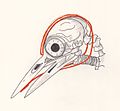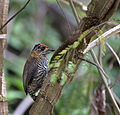Woodpecker





Woodpecker refers to any of the 180 species belonging to the family Picidae, which is part of the bird order Piciformes. Woodpeckers are known for their unique ability to peck at trees and wooden structures with their strong beaks, a behavior primarily associated with searching for insects, their larvae, or extracting sap and juices from the trees. This article provides an overview of the woodpecker, including its characteristics, habitat, and significance in various ecosystems.
Characteristics[edit]
Woodpeckers possess several distinctive physical and behavioral traits. They have strong, chisel-like beaks for drilling and drumming on trees, and long, sticky tongues for extracting food. Their zygodactyl feet, with two toes facing forward and two backward, along with stiff tail feathers, provide support and balance while climbing and pecking at vertical surfaces. Woodpeckers exhibit a wide range of sizes, from the small Downy Woodpecker to the much larger Pileated Woodpecker. Their plumage is often bright and colorful, with variations in coloration between males and females in some species.
Habitat and Distribution[edit]
Woodpeckers are found worldwide, except for Australia, New Guinea, New Zealand, Madagascar, and the extreme polar regions. They inhabit a variety of environments, including forests, deserts, jungles, and even urban areas, adapting well to different types of habitats where trees are available. The diversity of habitats reflects the adaptability of woodpeckers and their ability to find food and nesting sites in various environments.
Diet[edit]
The diet of woodpeckers primarily consists of insects and their larvae found within tree bark or wood. Some species also consume fruits, nuts, and sap. The Acorn Woodpecker, for example, is known for creating granaries by drilling holes in trees or wooden structures to store acorns. Woodpeckers play a crucial role in controlling insect populations, thus contributing to the health of their habitats.
Reproduction[edit]
Woodpeckers are cavity nesters, meaning they excavate holes in trees or wooden structures to lay their eggs and raise their young. The task of excavating typically falls to both male and female, and the cavities are also used for roosting and protection from predators. Most species are monogamous, with both parents sharing responsibilities for incubating the eggs and feeding the chicks.
Conservation[edit]
While many woodpecker species have stable populations, some are facing threats from habitat loss, deforestation, and competition for nesting sites, especially from invasive species like the European Starling. Conservation efforts are focused on preserving habitats and implementing measures to protect endangered species, such as the Ivory-billed Woodpecker, which is critically endangered and possibly extinct.
Cultural Significance[edit]
Woodpeckers have been featured in folklore and mythology in various cultures, often symbolizing hard work, determination, and the bringing of rain. They are also popular in modern culture, with characters like Woody Woodpecker bringing attention to these unique birds.

-
Pileated Woodpecker Feeding on Tree
-
Black-rumped Flameback
-
Dendrocopos major Skull
-
Ladder-back Woodpecker on Cactus
-
Woodpecker Tapping
-
Woodpecker Holes
-
Black Woods
-
Woodpecker Feeding Chick
-
Lesser Goldenback
-
Picumnus temminckii
-
Red-crowned Woodpecker Female
-
Cuban Green Woodpecker Female
Ad. Transform your life with W8MD's Budget GLP-1 injections from $75


W8MD offers a medical weight loss program to lose weight in Philadelphia. Our physician-supervised medical weight loss provides:
- Weight loss injections in NYC (generic and brand names):
- Zepbound / Mounjaro, Wegovy / Ozempic, Saxenda
- Most insurances accepted or discounted self-pay rates. We will obtain insurance prior authorizations if needed.
- Generic GLP1 weight loss injections from $75 for the starting dose.
- Also offer prescription weight loss medications including Phentermine, Qsymia, Diethylpropion, Contrave etc.
NYC weight loss doctor appointmentsNYC weight loss doctor appointments
Start your NYC weight loss journey today at our NYC medical weight loss and Philadelphia medical weight loss clinics.
- Call 718-946-5500 to lose weight in NYC or for medical weight loss in Philadelphia 215-676-2334.
- Tags:NYC medical weight loss, Philadelphia lose weight Zepbound NYC, Budget GLP1 weight loss injections, Wegovy Philadelphia, Wegovy NYC, Philadelphia medical weight loss, Brookly weight loss and Wegovy NYC
|
WikiMD's Wellness Encyclopedia |
| Let Food Be Thy Medicine Medicine Thy Food - Hippocrates |
Medical Disclaimer: WikiMD is not a substitute for professional medical advice. The information on WikiMD is provided as an information resource only, may be incorrect, outdated or misleading, and is not to be used or relied on for any diagnostic or treatment purposes. Please consult your health care provider before making any healthcare decisions or for guidance about a specific medical condition. WikiMD expressly disclaims responsibility, and shall have no liability, for any damages, loss, injury, or liability whatsoever suffered as a result of your reliance on the information contained in this site. By visiting this site you agree to the foregoing terms and conditions, which may from time to time be changed or supplemented by WikiMD. If you do not agree to the foregoing terms and conditions, you should not enter or use this site. See full disclaimer.
Credits:Most images are courtesy of Wikimedia commons, and templates, categories Wikipedia, licensed under CC BY SA or similar.
Translate this page: - East Asian
中文,
日本,
한국어,
South Asian
हिन्दी,
தமிழ்,
తెలుగు,
Urdu,
ಕನ್ನಡ,
Southeast Asian
Indonesian,
Vietnamese,
Thai,
မြန်မာဘာသာ,
বাংলা
European
español,
Deutsch,
français,
Greek,
português do Brasil,
polski,
română,
русский,
Nederlands,
norsk,
svenska,
suomi,
Italian
Middle Eastern & African
عربى,
Turkish,
Persian,
Hebrew,
Afrikaans,
isiZulu,
Kiswahili,
Other
Bulgarian,
Hungarian,
Czech,
Swedish,
മലയാളം,
मराठी,
ਪੰਜਾਬੀ,
ગુજરાતી,
Portuguese,
Ukrainian










